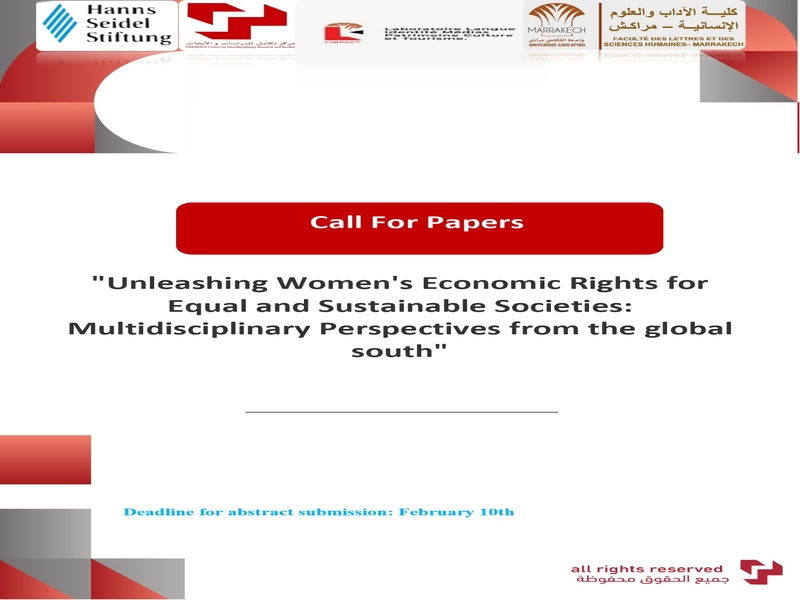Research Laboratory Language, Identity, Media, Patrimony, Culture and Tourism (LIMPACT), Faculty of Arts and Human Sciences of Marrakech, Cadi Ayyad University, Takamul Centre for Interdisciplinary Studies, and Hanns-Seidel-Stiftung Organize an International Conference on:
“Unleashing Women’s Economic Rights for Equal and Sustainable Societies: Multidisciplinary Perspectives from the global south”
May, 20-21, 2023
Despite multiple initiatives, sectoral plans, and programs to promote women’s economic participation (Min Ajliki, Green and Halieutis Plans, We4She), Moroccan women are kept from economic activity, the national business sector, and leading positions. Only 16.2 % of company leaders are women (compared to 62% in Sub-Saharan Africa). Morocco holds poor positions in the regional and global gender gap rankings (12 out of 19 and 143 out of 153 countries2020 World Economic Forum’s global gender gap index, respectively, and 146th in women’s economic participation and opportunity). The National Eligibility Cum Entrance Test(NEET) is higher among women (70% of male NEETs are unemployed, while 93% of female NEETs are inactive (World Bank, 2018).
The demand for women’s economic participation, and the maximization of their role in decision-making positions, is a requirement for social development and equality promotion. Women have been fighting for equal rights and against oppression for centuries; they have been demanding gender equality in areas traditionally thought of as men’s prerogatives. As such, women’s economic participation is a societal issue as it establishes a balance among society members based on creative human values. ILO conventions recommend equal opportunity in labor and education because “when female labor is underemployed or misused; because of discrimination against women in markets and institutions erected by society, which prevents them from completing their studies, from being able to practice certain professions and to obtain the same remuneration as men; economic losses ensue” (IMF, 2013). This means that there is evidence of economic loss each time women are not included in the economic ecosystem. Thus, women’s economic inclusion seems to be not only an important contributing variable in the gender equality equation, as it draws the design and layout of the democratic scene of a country, but also a pervading challenge to gender equality, inclusive and democratic society.

Takamul Center for Studies and Research
TAKAMUL CENTER is a diverse and integrated space of dialogue and debate between the largest possible number of scientific, intellectual, literary and artistic disciplines; This is due to our belief in the importance of integrative cognitive approaches that are not limited to a single specialized perspective or dimension in dealing with phenomena and studying them as they are.
